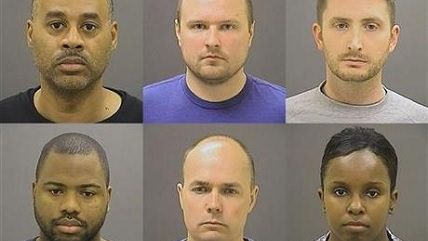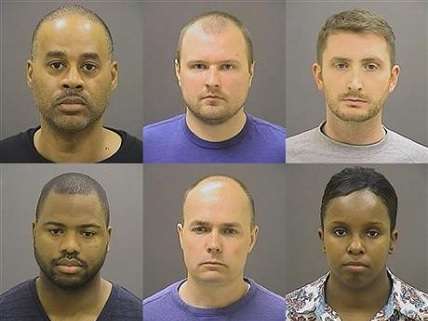Grand Jury Indicts Freddie Gray Officers
What happens when a prosecutor wants an indictment


A grand jury Baltimore returned indictment on most of the charges sought by the district attorney, Marilyn Mosby, against six officers involved in the death of Freddie Gray in police custody. Three minor charges were dropped and three new ones added based on new information—but the prosecutor wouldn't say what that information was. The Associated Press reports the outline of the DA's case:
Gray was arrested in the Sandtown-Winchester neighborhood of West Baltimore. According to court documents, Gray made eye contact with a police officer and took off running. He was apprehended two blocks away and arrested for possession of what Miller wrote in charging documents is illegal under a city ordinance.
Mosby said the arrest was unlawful because the knife is legal under state law.
None of the officers secured Gray's seatbelt in the van, a violation of police policy. Soon after he was placed in the van, Goodson stopped to secure him with leg irons because he had become "irate," police said.
After a ride that included several more stops, including one to pick up a second passenger, the van arrived at the Western District station house. By that time, Gray was non-responsive.
The defense for one officer, Edward Nero, argues the knife Gray possessed was illegal, or at least that the officer believed so, a defense against a charge of unlawful imprisonment.
While grand juries usually return indictments to prosecutors, it's not the case with cops. Yesterday I highlighted a Missouri prosecutor who had explained why that was the case. Via the Kansas City Star:
Jackson County Prosecutor Jean Peters Baker dismisses the idea that grand juries are manipulated by prosecutors.
"I've had grand jurors give an indictment to me and I've had them not give me an indictment," she said. "And I've certainly been surprised by their decisions."
If it seems that grand juries typically vote to indict, [Platte County Prosecutor Eric] Zahnd said, it's because ordinarily prosecutors only bring a case if they think there is evidence warranting an indictment.
"I'm not going to take a case to a grand jury in situations where I don't believe a crime was committed," he said.
The exception to that rule, Baker said, is police shootings. In those cases, she said, prosecutors generally turn to grand juries "to allow 12 impartial citizens from the community to decide whether or not to charge the officer and what those charges ought to be."
But if a prosecutor's made a decision that an indictment isn't warranted, how can a grand jury process led by her be impartial? Baker says because her office is an elected one she can be held more accountable for decisions on prosecuting police officers more than an independent prosecutor could, one part of efforts to place the authority to prosecute police officers accused of crimes somewhere other than with the prosecutors who work with police on a daily basis.
Baker's is a weak argument—the influence of police and other public unions, the benefits of incumbency, and the high barriers to entry all make the idea that the public could hold a prosecutor accountable at the ballot box, for a specific decision, an impossible one to swallow. Conversely, there were not unfounded fears the district attorney may have rushed to overcharge the officers. That would seem to be an effort to gain public support—an expected behavior for an elected office, in the justice system or not.


Show Comments (43)